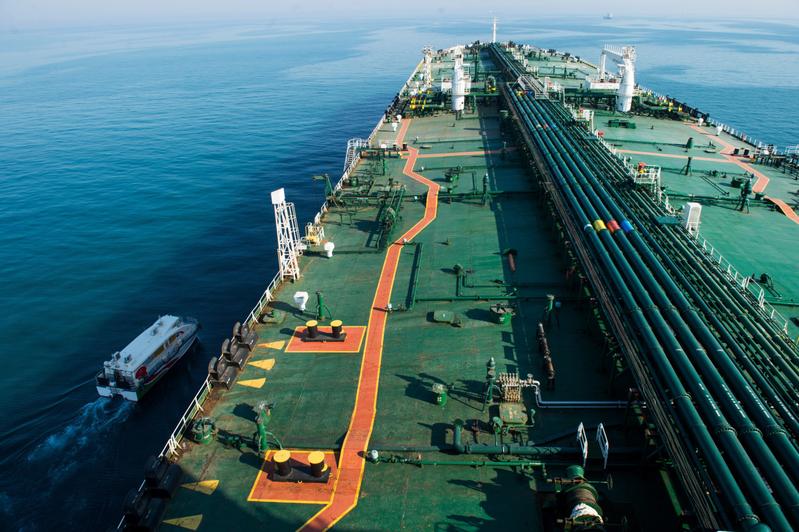 A support vessel sails alongside the crude oil tanker Devon as it sails through the Persian Gulf towards Kharq Island oil terminal to transport crude oil to export markets in Bandar Abbas, Iran, on March 23, 2018.
(ALI MOHAMMADI / BLOOMBERG)
A support vessel sails alongside the crude oil tanker Devon as it sails through the Persian Gulf towards Kharq Island oil terminal to transport crude oil to export markets in Bandar Abbas, Iran, on March 23, 2018.
(ALI MOHAMMADI / BLOOMBERG)
Iran is escalating its pressure on South Korea to release billions of dollars of oil-export revenue, arguing that Seoul is buckling to pressure from its US ally and illegally withholding funds needed to counter the Middle East’s worst coronavirus outbreak.
Abdolnaser Hemmati, the head of the Central Bank of Iran, said the actions of banks in South Korea were preventing Iran from using the money to buy foods and medicines, trade that’s exempt from US sanctions.
It is appalling to see that Korean banks have conveniently neglected their obligations, common international financial agreements, and decided to play politics and follow illegal and unilateral US sanctions
Abdolnaser Hemmati, head of Central Bank of Iran
“It is appalling to see that Korean banks have conveniently neglected their obligations, common international financial agreements, and decided to play politics and follow illegal and unilateral US sanctions,” Hemmati said in a written response to questions. Iran could launch legal action to gain access to the funds, he said, without naming the lenders in question.
READ MORE: Iran urges lifting 'inhuman' US sanctions amid COVID-19 epidemic
Hemmati also didn’t elaborate on the course of action that Iran may take. After sanctions were lifted under the 2015 nuclear deal, Iran the following year managed to unlock over US$6.4 billion of oil payments trapped in Indian accounts, using European banks as a clearing agent. The central bank has also filed lawsuits in Europe against financial companies that have withheld its money on the basis of court orders issued in the US.
Virus resurgent
Iran announced earlier this month that it had received medicines valued at US$500,000 from South Korea after two years of negotiations. At the time, Iran’s Foreign Ministry said the deal was approved by Washington. It also said South Korea was about US$7 billion in arrears for oil exported before the Trump administration last year reimposed penalties on Iran’s crude sales.
According to the Foreign Ministry in Seoul, the drugs shipped were for the treatment of genetic diseases. This month, South Korea plans to ship COVID-19 test kits worth US$2 million, it said.
“We have been consulting with the US, Iran and the banks holding the frozen funds, seeking to make progress on this issue,” said Koh Kyung-sok, a Foreign Ministry official. “So far, we’ve been able to utilize some of the funds to expand humanitarian trade with Iran, and will continue to seek ways to increase such exchanges,” he said by phone.
Iran reported a major outbreak of the coronavirus in late February and phased in restrictions to control the disease. The economic shock forced authorities to seek International Monetary Fund assistance for the first time since 1960.
The EU mechanism -- known as Instex -- provides European companies with a trading vehicle to sell goods and services to Iran without using dollars, routing transactions through US banks, or moving money across the Iranian border
Facing a widening budget deficit, and with its critical oil revenues drastically reduced by US sanctions, authorities eased the curbs on daily life and businesses on April 11. Infections have surged again, and the pathogen has now killed more than 8,000 people in the country.
Hemmati declined to say whether he had received an update from the IMF on the loan application. He said Iran is “weathering” the impact of the virus and even expects to see “moderate” economic growth by the end of the year.
ALSO READ: Official: Iran will never ask US for coronavirus help
Returning to South Korea, he said the two countries have been working on a special trade vehicle, similar to that established with the European Union, which would allow Iran to complete humanitarian transactions using the money locked in Korean banks.
The US, which abandoned the 2015 nuclear deal two years ago, has sought to “stonewall” the plan, according to Hemmati. President Donald Trump’s so-called “maximum pressure” strategy against Iran aims to force its leaders into renegotiating the nuclear accord and ending their support for Hezbollah and Iraqi militias.
The EU mechanism -- known as Instex -- provides European companies with a trading vehicle to sell goods and services to Iran without using dollars, routing transactions through US banks, or moving money across the Iranian border. But its impact has been limited due to companies’ fears over the reach of American penalties.
“Should Korean banks not adhere to their international agreements with us, we reserve our rights to take legal actions under international laws,” Hemmati said.










